What Does Nutmeg Taste Like? A Flavorful Journey to Discover
Nutmeg, a warm and aromatic spice, has intrigued culinary enthusiasts for centuries with its unique characteristics.
Nestled within the kernel of an evergreen tree, this humble ingredient carries a complex sensory profile that transforms dishes across global cuisines.
Professional chefs and home cooks alike appreciate its remarkable versatility in both sweet and savory recipes.
The spice's rich history spans continents, connecting ancient trade routes and modern kitchen traditions.
Exotic and mysterious, nutmeg offers more than just a simple flavor enhancement to your cooking repertoire.
Its potential to elevate ordinary meals into extraordinary culinary experiences makes it a fascinating ingredient worth understanding.
Dive into this flavorful journey and uncover the delightful secrets of nutmeg that await you.
Learn About Nutmeg
Nutmeg can remind you of cozy winter treats, but it actually comes from a tropical tree called Myristica fragrans. Here are some things to note:
How Nutmeg Is Made
When nutmeg fruit is ripe, it splits open to show a small nut about the size of a pecan. This nut has a lace-like cover that’s used to make a spice called mace.
The seed inside is left out in the sun for six to eight weeks, shrinking away from its shell until it rattles when you shake it. After drying, the shell is cracked open to collect the nutmeg.
You can buy nutmeg whole or already ground into powder. Most stores sell ground nutmeg, but if you grate it fresh at home, the flavor is much better.
What Nutmeg Really Tastes Like
Nutmeg is a cozy spice that brings warmth and a sweet, slightly nutty flavor to your food. Its taste is woody with a touch of clove, a little citrus, and even a bit of earthiness.
Nutmeg adds comfort to both sweet treats and savory dishes, as well as in different teas. People often compare it to cinnamon or cloves, but nutmeg’s flavor stands out all by itself and can taste a bit spicy if you’re sensitive.
Whether you use whole or ground nutmeg, its natural oils make it bold and noticeable, so just a little goes a long way. Most recipes use less than a teaspoon of nutmeg, since using too much can make your food taste bad and may even cause side effects like dizziness or feeling sick.
Comparing Whole and Ground Nutmeg
Fresh nutmeg has a much richer taste than the ground kind, thanks to its natural oils that fade quickly once the nutmeg is ground. If you can, it’s worth keeping whole nutmeg on hand and grating what you need, this gives your food the best flavor.
Pre-ground nutmeg is easier and quicker to use, making it great for busy days or recipes with lots of spices, like carrot cake. However, pre-ground nutmeg often doesn’t have the same bold aroma because it loses flavor over time, while freshly grated nutmeg packs a stronger, more vibrant punch.
Nutmeg and Mace Differences
Nutmeg and mace both come from the same tree, but they’re not exactly the same. Nutmeg is the seed inside the fruit, while mace is the red outer layer that wraps around that seed.
They taste a bit alike, but mace has a stronger, spicier kick, almost like pepper with a hint of saffron. Nutmeg is sweeter and has a warm, cozy flavor that’s great in desserts, sauces, and classic holiday drinks like eggnog.
Both spices add depth to recipes, but you’ll find nutmeg in more sweet treats and mace showing up in things like donuts, baked goods, and even savory dishes. Even though they can be swapped for each other if needed, they’re usually used separately and in small amounts.
Storing Nutmeg the Right Way
Keeping nutmeg fresh for longer is simple if you store it the right way. If you don’t mind a milder taste, you can keep using it for a long time. Try these easy tips to help your nutmeg stay at its best:
Use A Sealed Jar
Store nutmeg in a sealed jar or container to keep it fresh. Close the lid carefully after each use.
You can also fold the package top tightly. Sealing prevents air and moisture from reaching the spice, which helps maintain its flavor and strength.
Keep Away From Light, Heat, And Moisture
Nutmegs quickly lose their power and taste when touched by light, heat, or moisture. These things break down the spice fast.
Store nutmeg in a spot that's dark, dry, and cool - like a pantry shelf around 68 degrees F. Kitchen drawers and spice racks work well for keeping spices safe from damage.
Store Whole Nutmeg Nuts
Whole nutmeg stands out as the best choice for kitchen storage. Pre-ground nutmeg quickly loses its magic because more surface area meets damaging elements, which weakens its flavor and strength.
Whole nutmeg needs extra work during cooking compared to ground versions. Grating it fresh just before preparing meals ensures maximum taste.
Balancing convenience and quality matters most.
Smart shoppers pick whole nutmeg during grocery trips, particularly if spice use happens rarely.
Use Only A Dry Spoon
Rule for cooking: keep spoons dry when measuring nutmeg. Water hurts dry spices badly.
Grabbing any nearby spoon could ruin your spice. Carefully choose a clean, dry spoon to scoop nutmeg without adding unwanted moisture.
Do Not Freeze Or Chill Nutmeg
Nutmeg stands apart from other food items when it comes to storage methods. Typical preservation techniques like freezing or chilling work well for meats, vegetables, and bread.
Unlike many ingredients, nutmeg doesn't benefit from cold storage. Refrigerator conditions with moisture can actually harm its quality.
Storing nutmeg at room temperature keeps it in the best condition.
When Your Nutmeg Has Gone Bad
Nutmeg, whether ground or whole, doesn’t really go bad, but it will lose its flavor over time. If you notice any of these signs, it’s time to throw it out:
Odd Smell
Signs of spoiled nutmeg start with a bad smell. Open the jar or bag and smell the spice.
When nutmeg smells different from its original scent, it means you should throw it out.
Loss Of Flavor
Crush a small piece of nutmeg between your fingers and taste it. When nutmeg loses its strong flavor and smell, it means you should replace your current spice with a fresh batch.
Changes In Look
Check nutmeg carefully for signs of spoiling. Mold or strange growth means you should throw it away.
Moisture sometimes sneaks into spice storage and causes problems. Pantry bugs near your nutmeg signal it's time to discard the spice.
Check The Expiration Date
Spice lovers sometimes forget about nutmeg hiding in their kitchen cabinets. Before using it, peek at the date printed on the package.
Good news: it might still work fine for another year or two after the printed date.
Nutmeg sitting around for a super long time needs to go straight into the trash.
Keeping decade-old spices won't help your cooking. Old nutmeg does nothing to make your dishes taste better, so buying a fresh bag makes way more sense.
Nutmeg Swaps for All Recipes
If you’re out of nutmeg, don’t worry, there are plenty of other spices you can use instead. Here are 9 great options to try in your recipes:
Getting Nutmeg Ready for Cooking
If you need something quick, pre-ground nutmeg is the easiest choice. But if you want the richest nutmeg flavor in your food, it’s best to use whole nutmeg.
Turning whole nutmeg into powder isn’t hard, and there are three simple ways you can do it at home. If you’re curious about how to get started, you’re in the right place!
Use A Nutmeg Mill
Nutmeg grinders look just like pepper mills but are made to hold whole nutmeg seeds. These tools keep you safe from knife cuts when preparing this spice.
Electric models make things super easy. Simply open the grinder, put the nutmeg seed inside, close the lid, and watch it work.
Manual grinders need a bit more effort. You turn the handle several times to create the amount of ground nutmeg you want.
Grate Nutmeg With A Grater
Nutmeg graters come shaped like a curved arc with tiny holes. These special tools make ground nutmeg much finer than typical kitchen methods.
First, break open the hard shell and remove it from the seed. Hold the grater at a slanted angle and move the nutmeg smoothly across its surface.
When grating happens, delicate lace patterns appear while releasing a wonderful smell. Sharp edges mean you should watch your fingers to avoid accidental cuts.
Grate Nutmeg With A Microplane
Microplane tools make grating super easy. You can use this handy kitchen helper to turn tough nutmeg seeds into fine powder.
Standard cheese graters with tiny holes also work well when you need a quick solution.
Grating nutmeg follows similar steps with a microplane as with a specific nutmeg grater.
Sharp edges mean fast and smooth work. Smart cooks grate only what they need because ground nutmeg loses flavor quickly when stored.
Simple methods help you enjoy that delicious nutmeg taste in no time!
What Pairs Well With Nutmeg?
Nutmeg is a favorite sweet spice that tastes great with squash, potatoes, lamb, and pork. It stands out on its own, unlike some other spices that need to be mixed with others.
If you want to add even more flavor to your dish, you can mix nutmeg with herbs and spices like parsley, oregano, basil, rosemary, cardamom, anise, cumin, thyme, or dill.
Delicious Dishes With Nutmeg
Nutmeg has the power to turn simple meals into something special with just a little sprinkle. Keep reading to find some of the best sweet and savory recipes that use this tasty spice.
Southern Pie Without Crust
Southern pie lovers know this custard dessert brings magic to the table. Kitchen shelves likely hold all needed ingredients for this sweet treat perfect for dinner.
Smooth flavor dances across taste buds with incredible ease. Warm nutmeg adds deep richness that makes people smile.
Simple cream or fresh berries on top make this dessert impossible to resist.
Apple Jam Pie
Apple, cinnamon, ginger, and lemon merge into a special spreadable delight. This recipe captures the essence of apple pie filling, now in a smooth jam.
Spread it on toasts, ice creams, and peanut butter sandwiches.
Fall mornings welcome this comforting breakfast companion.
You can easily adjust the apple type and sugar levels to match your taste preferences. Each spoonful promises a perfect balance of sweet and spicy flavors.
Missing out on this tasty apple pie jam would be a mistake. Simple ingredients and quick preparation make it a must-try recipe for anyone who loves sweet spreads.
Butternut Squash Soup (Roasted)
Soup makes cold, rainy days much better with a warm bowl of butternut squash. Nutmeg, honey, and ginger blend together to create a comforting mix that wraps you in warmth.
Rich and creamy, this soup offers a sweet touch perfect for relaxing moments.
Roasting squash brings out deep, rich flavors that steaming cannot match.
Packed with healthy vegetables, this fall dish delivers more than just good taste. Chilly days call for this simple comfort food that warms both body and spirit.
Armenian Cake With Nutmeg
Armenian nutmeg cake wins hearts with its crispy bottom and soft top layer. Hints of sweetness remind you of warm biscuits sprinkled with crunchy walnuts, making each slice feel like pure bliss.
One taste melts smoothly on your tongue, revealing why this dessert delights everyone who tries it. Simple to make without fancy kitchen tools, it becomes an instant favorite for anyone with a sweet tooth.
More to Know About Nutmeg
Many people don’t realize just how wonderful nutmeg can be. Once you check out the info below, you’ll likely enjoy and value this spice even more.
Sad Story Behind Nutmeg
Nutmeg's story starts in the 1st century A.D. People believed this spice could make you see things, which made it super special for rich folks.
Only a few traders knew where it came from - the Spice Islands - and they sold it for huge amounts of money.
Nutmeg's fame kept growing, and in the 17th century, something terrible happened.
Dutch traders started a brutal war against people living on Banda Island. Shocking numbers tell the tale: 15000 natives died, with just 1000 survivors.
Through this violence, the Dutch took over the nutmeg trade.
Dutch East India Company came next.
British colonizers saw an opportunity during the East Indies occupation. They secretly took nutmeg seeds and started planting them in their own territories.
Nutmeg plantations spread quickly after this, causing prices to drop worldwide. Right now, Indonesia leads global production, making 75% of the world's supply.
Grenada follows with 20% of production.
8 Nutmeg Health Perks You May Not Know
Nutmeg offers more than just great taste. Health perks make this spice worth adding to your cooking right now!
Helps You Sleep Well
Scientists have found that nutmeg might help people sleep better and longer, though more research is needed to confirm these results. When sleep seems difficult, mixing a tiny bit of nutmeg into warm milk before bed could potentially help you rest more soundly.
Pain Relief Support
Nutmeg holds special healing powers through its natural oils. Medical research shows these oils help reduce body pain and swelling.
People suffering from joint discomfort or muscle aches might find relief by using this simple spice. Inflammation can decrease when nutmeg enters your body's system.
Sore muscles and painful joints could feel better with regular nutmeg use.
Better Digestion Support
Nutmeg offers health benefits that can help with digestive problems. People struggling with stomach discomfort like diarrhea, gas, bloating, or constipation might find relief by adding a small amount of this spice to their dishes.
Good For Your Teeth
Nutmeg oil shows up in many dental care items. Its special qualities fight harmful bacteria inside mouths.
Scientists have found this natural ingredient stops germs that cause dental problems. Macelignan, one specific chemical in nutmeg, helps protect teeth from developing cavities.
Skin Health Support
Nutmeg works wonders for skin health with its special healing powers that fight swelling and bacteria. People can use this spice to clean out blocked pores and stop acne from spreading.
One simple method involves mixing nutmeg with honey in matching amounts. Spread this smooth blend over problem spots on your skin. Wait about 20 minutes, then rinse with warm water to see clearer results.
Can Help With Losing Weight
Nutmeg packs more than tasty flavor. People who want to boost their health might find this spice helpful.
Its powers go beyond making food taste good. Nutmeg supports body cleansing by helping remove harmful substances.
People watching their weight could benefit from sprinkling some nutmeg into regular meals. Small amounts can support metabolism and help wellness goals.
Regular use supports better digestive processes while giving dishes an extra touch of warmth and flavor.
Lifts Your Mood Naturally
Saffron helps people feel better and relaxes the body naturally. Medical treatments from ancient India have long used this special spice to help folks manage stress and mood problems.
Protects Liver Function
Nutmeg includes myrislignan, which helps protect your liver from damage and sickness. Medical research shows this natural compound can clean out harmful substances in your body.
People dealing with liver problems might find this ingredient especially helpful. Simple studies indicate myrislignan reduces swelling and supports overall liver health.
Nutmeg Taste and Usage FAQs
1. Can I use nutmeg in coffee?
Definitely! Sprinkling a little nutmeg on your coffee or latte gives it a comforting aroma and unique taste. It’s a simple way to add a little extra flavor to your morning drink.
2. Does nutmeg make you feel sleepy?
Yes, a pinch of nutmeg can help you relax and may make it easier to fall asleep. Nutmeg has natural compounds that help calm the nerves and muscles, so people sometimes add it to warm milk before bed.
3. Is nutmeg safe for babies?
A very small pinch of nutmeg can be added to baby food or milk for babies over six months old. It’s best not to give too much, though, and always check with your doctor if you’re not sure.
4. Does nutmeg taste the same as cinnamon?
No, nutmeg and cinnamon are different, though they go well together. Cinnamon tastes spicier and sweeter, while nutmeg is milder and has a subtle, nutty sweetness.
5. Can nutmeg help with sleep problems?
Yes, nutmeg is often used as a natural remedy for insomnia. Mixing a small pinch into warm milk or honey before bed can help promote a restful night’s sleep.
6. How can I use nutmeg in cooking?
Nutmeg works in both sweet and savory dishes. It’s delicious in pies, cakes, oatmeal, mashed potatoes, pasta sauces, soups, or sprinkled over hot drinks. Always start with just a small amount, since nutmeg is quite strong.
7. Are there health benefits to eating nutmeg?
Nutmeg is full of antioxidants and has anti-inflammatory properties. It may help with digestion, lower blood pressure, and reduce stress. But remember, enjoy it in small amounts.
8. Can you use too much nutmeg?
Yes, using too much nutmeg isn’t safe and can cause side effects like dizziness or stomach pain. Just a pinch is enough to get the flavor and possible benefits.
9. How should I store nutmeg?
Keep nutmeg in a sealed container, away from heat and sunlight, to keep its flavor fresh for longer.
Nutmeg Is Nice and Useful
That’s it for our nutmeg guide! I hope you picked up some tips to make your cooking even better with this flavorful spice.
Nutmeg isn’t just for holiday treats and eggnog, it can add a special touch to all kinds of meals and baked goods. Next time you use nutmeg, you’ll know just what it brings to your dish.
If you enjoyed these ideas, feel free to share them with friends and family, because great food is always best when shared.

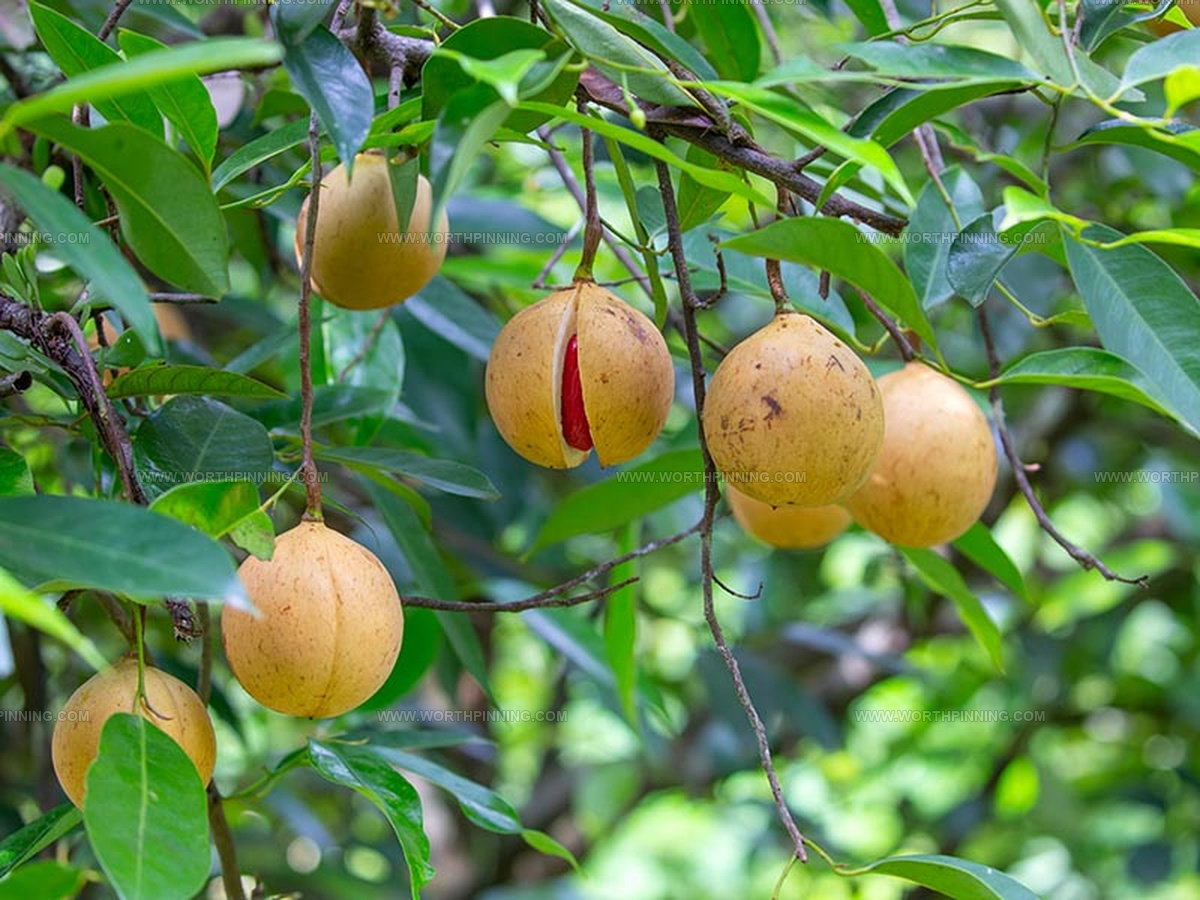
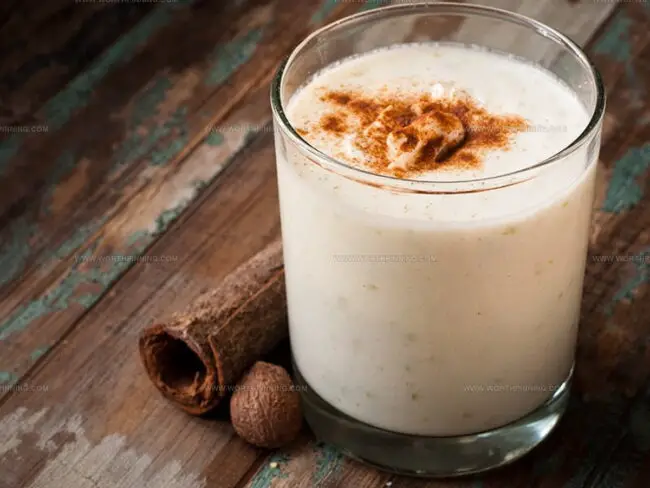
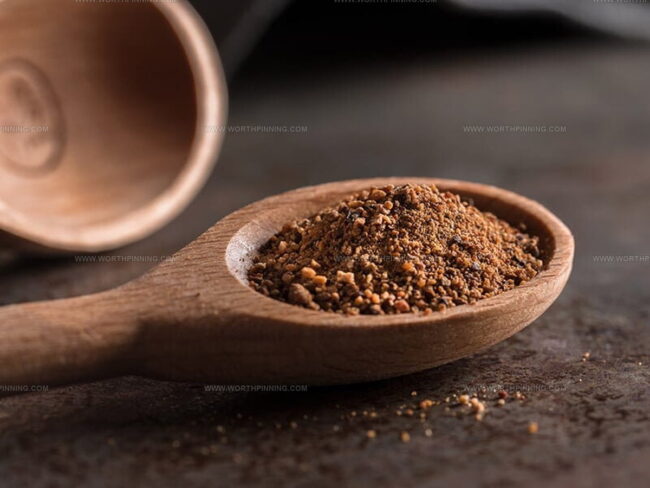
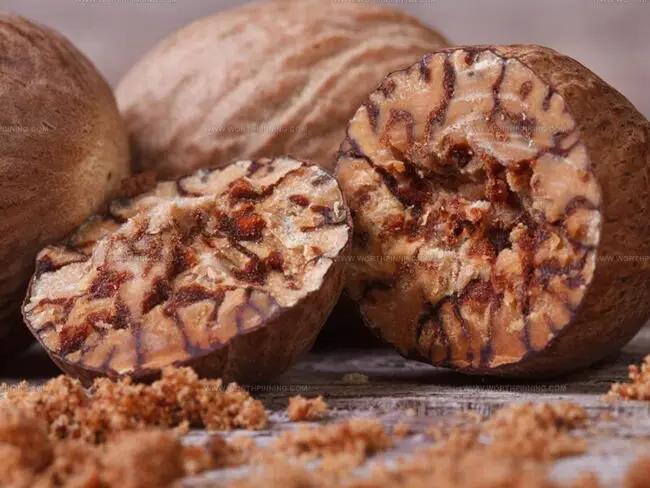
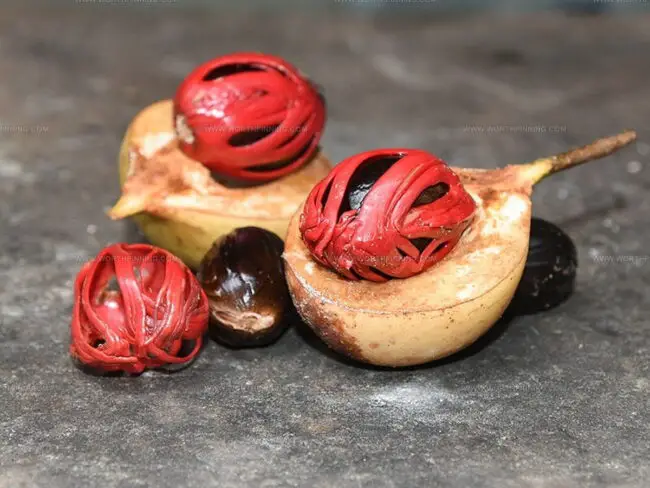
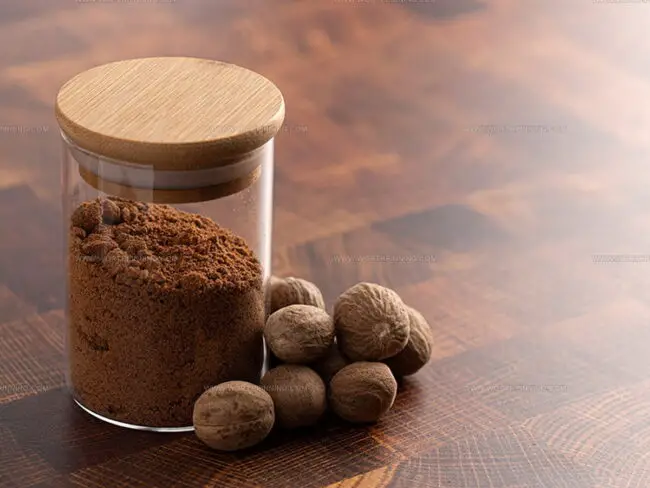
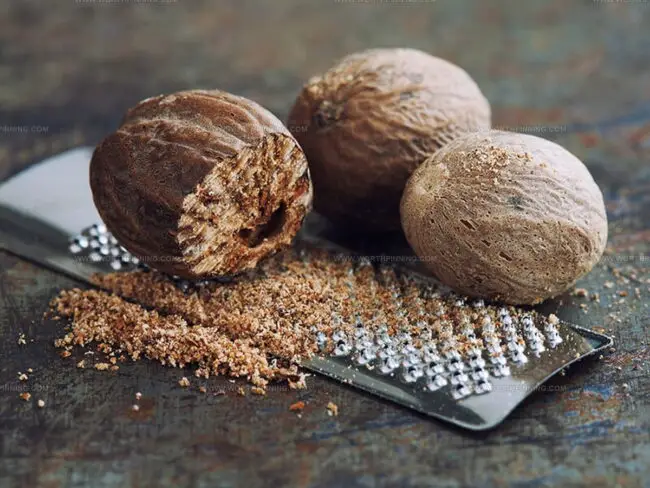
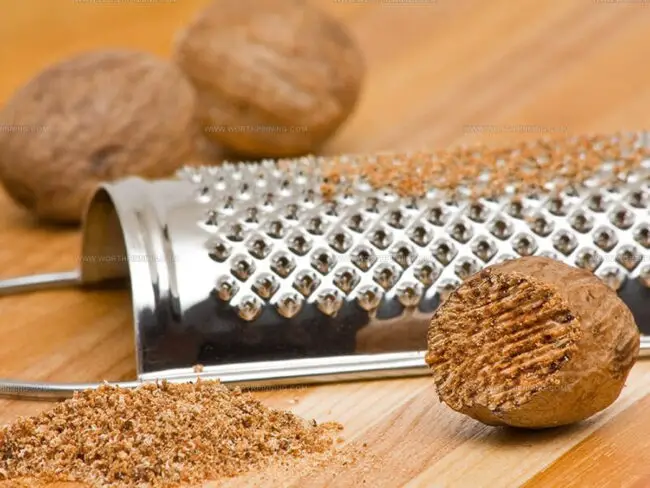
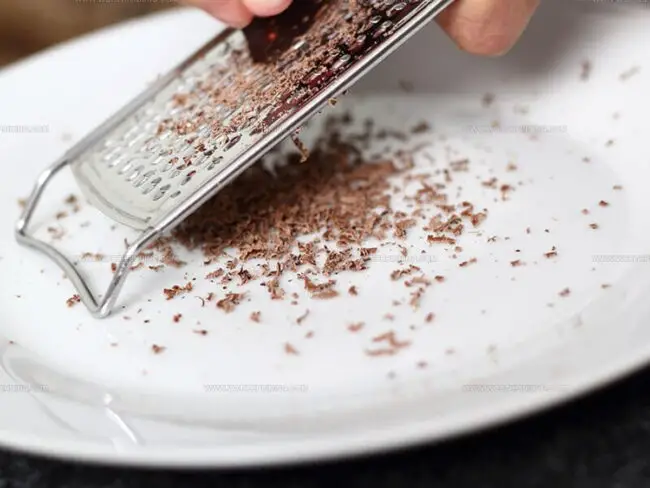

Sophia Rivera
Recipe Developer & Kitchen Tips Specialist
Expertise
Education
Austin Community College
San Antonio Culinary Institute
Sophia’s passion for baking began in her family kitchen, where she spent hours experimenting with new recipes. With a background in baking and pastry arts, she loves making desserts that are as visually stunning as they are delicious.
Sophia is all about using seasonal, locally sourced ingredients to create treats that everyone will enjoy. When she’s not creating mouth-watering desserts, you can find her gardening, making new recipes, or enjoying a relaxing afternoon with her family.